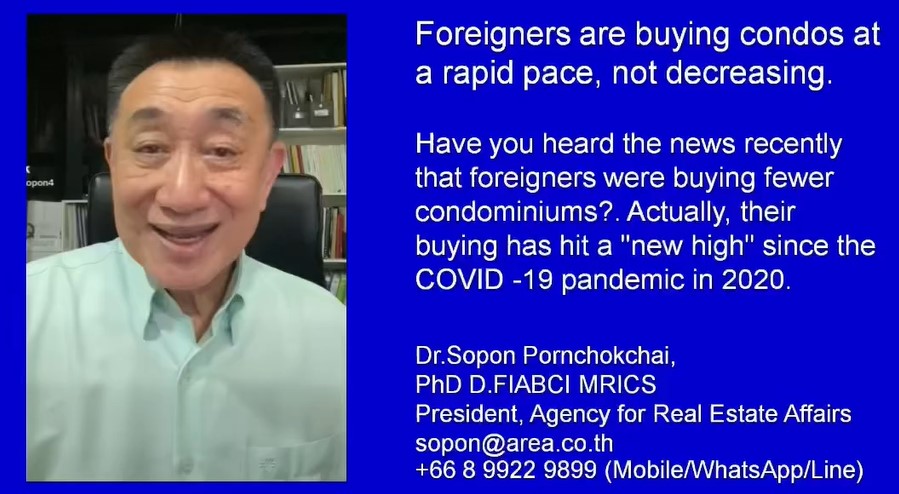 |
|||||||||||||
|
|||||||||||||
Foreigners are buying condos at a rapid pace, not decreasing.
AREA Press Release No. 779/2024: September 02, 2024
Dr.Sopon Pornchokchai, Ph.D. Dip.FIABCI, MRICS
President, Agency for Real Estate Affairs (AREA)
Don't misunderstand that foreigners are buying fewer condos. This misunderstanding will help come up with more measures to encourage them to buy more. Dr. Sopon revealed that foreigners buying condos in the Bangkok Metropolitan Region has hit a "new high" since the COVID -19 pandemic in 2020.
Dr. Sopon Pornchokchai, President, Agency for Real Estate Affairs Co., Ltd. (www.area.co.th), revealed the latest data that in mid-2024, foreigners bought condominiums in Bangkok and its vicinity, up to 2,885 units, or it is expected that there will be a total of 5,770 units purchased for the whole year, the highest since the outbreak of the COVID -19 pandemic. During 2020 to 2023, only 1,017, 1243, 4,203, and 5,036 condominiums were sold to foreigners, respectively. Therefore, in 2024, there will be a growth of 13% more than in 2023.
Table 1: Number of condominium units reserved by foreigners in Bangkok and its vicinity, 2019-2024
Year Number of condominium Units % change
2019 6,557
2020 1,017 -84%
2021 1,243 22%
2022 4,203 238%
2023 5,036 20%
2024 5,770 15%
Source : Agency for Real Estate Affairs Co., Ltd.
However, the number of condominiums purchased in 2019 was still higher than at present. In 2019, foreigners purchased 6,557 condominium units. In 2024, it is expected that foreigners will purchase 5,770 condominium units, the highest number since the Covid-19 pandemic. It is still lower than the previous record. This is probably because the Chinese and global economies are in a slump. Importantly, the Chinese government still controls the withdrawal of foreign currency from the country, etc.
Previously, the Government Housing Bank Data Center stated that “the study results showed that the number of foreign ownership transfers in the second quarter of 2024 decreased by 6.2% and 17.7% respectively, compared to the same period of the previous year, at 3,342 units, 11.8%, with a value of 14,874 million baht, or 21.1% of the total ownership transfers.” Dr. Sopon would like to emphasize that the transfer of ownership at a certain time is not a sales-marketing activity of that period. Those who transferred ownership this year probably booked their residences for 3, 2, 1 years, or 6 months ago, but only transferred them at present. The decrease in the number of transfers is probably because foreigners bought condominiums during the downturn during COVID-19, which was 2020-2022, but have only just started transferring at this time.
The survey by the Agency for Real Estate Affairs is the current booking as of mid-2024. It was found that there are 97,813 condominium units for sale, 17,306 units have been sold. Of this number, 2,885 units were purchased by foreigners, accounting for 16% of the total. These condominiums are worth 76,355 million baht, with foreigners purchasing 18,205 million baht, accounting for 23% of the total value of condominiums sold. This is the highest proportion ever. Dr. Sopon said that the reason is because Thai people's purchasing power has decreased at this time. Therefore, the proportion of foreign purchases has increased.
The area with the most foreigners buying condominiums is the Ratchada-Lat Phrao area, with foreigners buying 1,024 units out of 2,012 units, with a total value of approximately 4,031 million baht, or 51.7 % of the total value sold in this location. However, the area with the highest trading value is the city center, with foreigners buying 895 units out of 3,730 units, with a total value of approximately 10,373 million baht, or 27.7 % of the total value sold in this location. This case shows that foreigners prefer to buy residences in the city center, so it is not necessary to allow foreigners to buy condominiums in general areas.
The price level that foreigners like to buy is 6.31 million baht on average, which is higher than the price that Thai people generally buy at around 4.5 million baht. For details, it will be found that the sales units that foreigners buy are usually priced at 2-3 million baht, with 985 units, followed by the price level of 3-5 million baht, with 752 units. However, the highest value level of real estate that foreigners buy is priced from 5 million baht and up.
This shows that Thailand should set a minimum price that foreigners can buy, such as a price level of no less than 10 million baht, to prevent foreigners from competing to buy houses from Thais, which would increase the price of houses. In Western countries, there is no minimum price set for foreigners to buy houses because the price of houses in those countries is already high. However, in countries where the price of houses is cheaper than in Western countries, there are regulations on the minimum price that foreigners can buy, such as Indonesia setting it at around 10 million baht, Malaysia setting it at around 15 million baht.
Moreover, Dr. Sopon suggested that if the government has the following policies towards foreign buyers, it will greatly stimulate the economy.
1. Collect a purchase tax of 10-20 percent of the market price. In Europe, Hong Kong and Singapore, the tax is around 10-20 percent, 30 percent and 60 percent respectively. As an incentive, Thailand may collect a lower rate.
2. Land and building tax is 1% of the market price. In the United States and Western countries, this tax is 1-3% of the market price or the government assessment price. In other countries, the government assessment price is no different from the market price.
3. Collect a profit tax from resale at 10-20 percent of the market price, such as in the United States, it is around 20 percent, in Taiwan, it may be as high as 40 percent, etc.
4. Inheritance tax, such as 10 percent of the estate's market value, while in other countries it is collected at a rate of 20-50 percent.
The government should also set additional measures, such as stipulating that foreigners who buy houses or condominiums in Thailand can resell them only after 3 years to prevent speculation, including stipulating that foreigners can borrow money to buy houses from financial institutions in Thailand to make it more convenient for foreigners to buy, but allowing a loan of no more than 50% of the market price to stimulate domestic finance and protect the interests of financial institutions and shareholders who lend money.
These measures will provide Thailand with more capital to develop the country.
Note:
Dr.Sopon Pornchokchai, PhD D.FIABCI MRICS
sopon@area.co.th
Dr.Sopon gained a PhD in land and housing from AIT and had further property valuation training from LRTI-Lincoln Institute of Land Policy and housing from KU Leuven (Belgium). He runs Agency for Real Estate Affairs as the first and most comprehensive real estate information centre since 1991. We are property valuation and research centre while refrains from self-interest real estate development nor brokerage activity. Our AREA Real Estate Information centre is very much independent with no real estate developers or bankers sitting at our board members. We have been in operation for 33 years with trust from the public.
Currently, Dr.Sopon is the President of FIABCI Thai (International Real Estate Federation, Thailand’s Chapter), the Thai Appraisal and Estate Agents Foundation and the Agency for Real Estate Affairs, His research master pieces include the discovery of 1,020 slums (1985), CAMA (computer-assisted mass appraisal) modeling (1990), forecast of 300,000 unoccupied housing units (1995 and 1998), study for property information centre (2000), roadmap for valuation, Ministry of Finance, Vietnam (2006), Ministry of Finance, Indonesia (2008), World Bank Indonesia (2010), Ministry of Finance, Cambodia (2012), UN World Cities (2015), ASEAN Property Surveys (2017), Global Municipal (2017), Bangkok Zoo relocation (2019), Valuation of 28 dams in Laos (2024).
https://www.facebook.com/dr.sopon4/videos/384384921161462/
https://www.tiktok.com/@dr.sopon4/video/7410263342541032712?lang=th-TH



